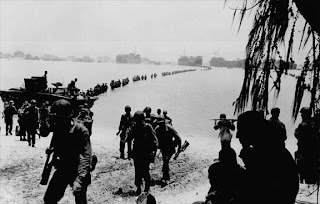Reporters Encircle "Tokyo Rose"
The cash-for-interview offer was stunning, but Felipe was dubious. He thought there was was something fishy about the offer. Why, he asked, were correspondents offering such a huge sum of money to interview a female radio broadcaster? He told his wife that the money might be a lure to snare a propaganda broadcaster. Maybe the American military did not view Tokyo Rose in the same favorable way Toguri thought of herself. Tokyo Rose was a melded personality made up of several different individuals, how could Toguri be sure that the reporters would accept her rather than June Suyama or Ruth Hayakawa? Despite Felipe’s concerns, Toguri was determined to do the interview and collect the money. There were other female announcers who could claim the title “Tokyo Rose”. As far as Toguri was concerned, there was no risk. She and Major Cousens had labored over scripts and her on-air delivery to mold Orphan Ann into a non-threatening buddy, who at worst teased GIs and at best boosted their morale.
Toguri was wrong, and her husband was right. To some, Tokyo Rose was a propaganda caricature. On August 7, 1945, the Navy had issued a tongue-in-cheek citation to Tokyo Rose for entertaining American troops—for consistently providing “...excellent state-side music, laughter, and news about home.” (Duus, p. 11) But for every solicitous opinion of Tokyo Rose there was a counter sinister point of view. Toguri had no way of knowing that the legend of Tokyo Rose had morphed into a bigger-than-life siren who slept with Prime Minister Tojo, predicted Allied troop movements, and broke the hearts of young GIs with stories of wayward girlfriends. American correspondents scouring Tokyo for Rose weren’t searching for a wise-cracking comedian. They wanted a sensational siren of the Pacific like Mata Hari, the exotic dancer and German World War I spy.
Never the reflective sort, Toguri saw only the wonderful opportunity for her and d’Aquino to buy passage home, and they would have money left over to start a new life in the states. Naiveté and greed are a dangerous combination. Even though Toguri believed her broadcasts were harmless, she had been broadcasting enemy propaganda. Somewhere deep inside her, a caution light had to be blinking. But the hook was well-baited, and, suppressing any inner reservations, Toguri contacted the two correspondents, Clark Lee and Harry Brundidge. A meeting was arranged for the next afternoon at the swanky Imperial Hotel.
When the slight, decidedly unglamorous Iva Toguri walked into their hotel room, Brundidge and Lee were astonished. They were expecting a honey-voiced sexpot, and instead they got a chatterbox who wore her hair in pigtails tied with red ribbon. Years later Toguri said, “It should have been Ava Gardner, but instead it was me.” Disappointed but undaunted, the correspondents were not going to allow reality to spoil a good story. This was the scoop of a lifetime. Harry Brundidge, an associate editor of Cosmopolitan, and Clark Lee, a correspondent for the International News Service, were not about to let it slip away. Brundidge repeated the offer of a $2,000 contract for an exclusive interview with Tokyo Rose. She signed and spent the afternoon dictating her story. She talked about the subversive intent of The Zero Hour, smuggling supplies to POWs, and her experiences with the Japanese secret police.
When Toguri left Lee turned to Brundidge and said, “This story is a bunch of baloney.” Nevertheless, the next day Lee cabled a story to the Los Angles Examiner. It was titled “Traitor’s Pay—Tokyo Rose 100 Yen a Month—$6.60.” The story was a sensation.
"Tokyo Rose" now had a face and a name - Iva Toguri









